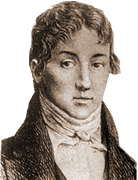First Triumvirate (Argentina)
The First Triumvirate (Spanish: Primer Triunvirato) was the executive body of government that replaced the Junta Grande in the United Provinces of the Río de la Plata (modern-day Argentina). It started its functions on September 23, 1811, and was replaced on October 8, 1812.
Origin
After the defeat of the patriotic forces at the Battle of Huaqui on June 20, 1811, the already damaged prestige of the Junta Grande received a fatal blow.
The Junta's President, Cornelio Saavedra, decided to take responsibility of the Army of the North (Spanish: Ejército del Norte) so he left office to be personally in charge of the Army. His departure gave room to the faction that supported liberal Mariano Moreno to take advantage of his absence and try to force the dissolution of the Junta.
A Triumvirate was chosen to wield the executive power. However, this Triumvirate was controlled by a Junta Conservadora (English: Conservative Junta), composed by the members of the recently dissolved Junta.
Actions
This government took actions of great transcendence. Some of which are:
- Declaration of the Freedom of Press.
- Approving of the Law of Individual Security.
- Creation of the Chamber of Appeals.
- Regulation of the Institution and Administration of Justice.
- Created on January 13, 1812 the Intendency of the Buenos Aires Province.
- Ordered Manuel Belgrano to lead troops to protect Rosario from naval attacks dispatched by Spaniards from Montevideo.
- Approved the use of the White and Cerulean Blue Insignia by the Army on February 18, 1812.
- On the same day ordered Belgrano to take charge of the Army of the North.
- Ordered Lieutenant Colonel José de San Martín the formation of a special cavalry corp which would be known as Granaderos a Caballo.
- Commission of Immigration: Founded on September 4, 1812 and constituted the first established entity to foment immigration and colonization of the territory (which wasn't clearly defined by the time). The Wars of Independence impeded its functionality, but it was reactivated by Bernardino Rivadavia when in charge of the government of Buenos Aires, on 1824. Dissolved on August 20, 1830 by Juan Manuel de Rosas.
End
The actions of its members was limited by successive struggles of power. With this government the morenistas successfully neutralized their opposition, but the internal struggles, the menace of an invasion from Brazil and the military misadventures of Manuel Belgrano in the north undermined their power.
José de San Martín, with the members of the Logia Lautaro (Lautaro Lodge) and the Sociedad Patriótica (Patriotic Society) which was formed by morenistas coincided on giving privilege to the organization of a liberation army and declaration of Independence. It was then when the destitution of the Triumvirate members and to return to the line of action impulsed by the Society. The Lautaro Lodge, on the other hand, mobilized its troops and the Patriotic Society recurred to public petitions and mobilization of the population.
The triumvirate was then replaced by the Second Triumvirate.
Members
- Feliciano Chiclana, Juan José Paso and Manuel de Sarratea.
- Secretaries without right to vote: Bernardino Rivadavia, Julián Pérez and Vicente López y Planes.
|
Bibliography
- Busaniche, José Luis (1969). Historia argentina (in Spanish). Buenos Aires: Ed. Solar.
- Lozier Almazán, Bernardo (1998). Martín de Álzaga (in Spanish). Buenos Aires: Ed. Ciudad Argentina.
- Mitre, Bartolomé (1968). Historia de San Martín y de la emancipación sudamericana (in Spanish). Buenos Aires: Ed. Eudeba.
- Segreti, Carlos S. A. (1980). La aurora de la Independencia - Memorial de la Patria (in Spanish). Buenos Aires: Ed. La Bastilla.
- Sierra, Vicente D. (1973). Historia de la Argentina (in Spanish). Buenos Aires: Ed. Garriga.
- Ternavasio, Marcela (2007). Gobernar la Revolución (in Spanish). Buenos Aires: Ed. Siglo Veintiuno.
- Bra, Gerardo. "El Motín de las Trenzas". Revista Todo es Historia (in Spanish) (187).
- Fernández, Alejandro E.; Aníbal Jáuregui; Darío Roldán. "Un golpe militar en el camino hacia la independencia". Revista Todo es Historia (in Spanish) (192).
- Heredia, Edmundo. "Expediciones reconquistadoras españolas al Río de la Plata (1811-1814)". Revista Todo es Historia (in Spanish) (201).



